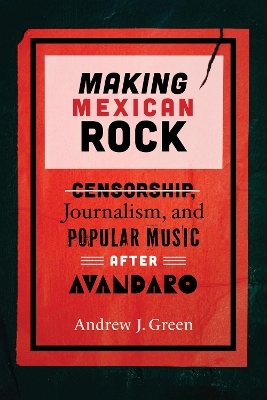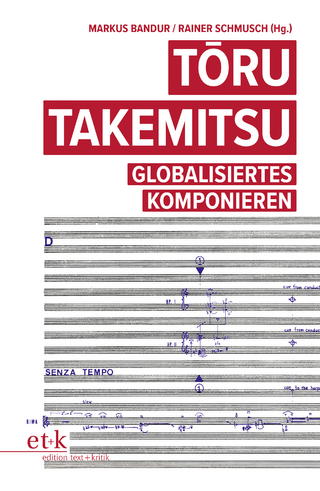
Making Mexican Rock
Vanderbilt University Press (Verlag)
978-0-8265-0729-7 (ISBN)
Mexican rock history has tended to end as Mexican democracy begins. The history of the genre has often been narrated teleologically: apparently censored under single‑party rule after the scandalous AvÁndaro Festival of 1971, rock constituted a potent expression of freedom in the late twentieth century, forging a strong association with Mexico’s transition away from authoritarian rule and toward neoliberal democracy. There is another story to tell, however, about the transformations in ideology underpinning rock’s emergent, cascading histories in Mexico, and about ways that these transformations have been contested. Placing history and ethnography into dialogue, Making Mexican Rock tells this story, reflecting on the imbrication of scholarship and journalism with the legitimizing myths of neoliberal globalization.
Ethnomusicologist Andrew Green provides a counterpoint to studies of Latin American rock in which the state constitutes the “prime mover” of censorship against the genre. Eric Zolov’s Refried Elvis, still considered the definitive history of Mexican rock, concludes that the state censored rock by preventing its commercialization, and that rock led the resistance against single‑party rule during the democratic transition. Rock is understood, here, as a consistent antagonist of monolithic state power. Making Mexican Rock presumes a more distributed account of censorship that reflects extra‑ and para‑governmental sources of rock repression. There exist multiple “ends” of Mexican rock history, episodes of censorship which have recurred periodically ever since rock’s arrival to Mexico in the late 1950s, and there are shifts in ideology that change how these episodes are remembered—or indeed whether they are remembered at all.
Andrew Green is an ethnomusicologist and popular music scholar whose work focuses on the music industries and activism in Mexico. He is an associate professor at the University of Warsaw’s Faculty of Artes Liberales.
Introduction
Chapter 1: After AvÁndaro: Censorship and Rock Journalism as Governmentality in the 1970s
Chapter 2: Producing Independence: The Rock Boom and Commercial Censorship
Chapter 3: The Monopolistic Ogre? OCESA, Live Rock, and Enclosure
Chapter 4: On Solidarity and Silence: Music Censorship, Open-air Performance, and Zapatismo
Chapter 5: Listening down the Rabbit Hole: Independent Musical Venues, Democratic Governance, and the Performance of Transition
Chapter 6: Foros culturales, History, and the Right to Culture
Chapter 7: Write for Your Right to Party: Rock Knowledge and the Opening of History
Notes
Bibliography
Index
| Erscheinungsdatum | 17.10.2024 |
|---|---|
| Reihe/Serie | Performing Latin American and Caribbean Identities |
| Zusatzinfo | 4 b&w images |
| Verlagsort | Tennessee |
| Sprache | englisch |
| Maße | 152 x 229 mm |
| Themenwelt | Kunst / Musik / Theater ► Musik ► Musiktheorie / Musiklehre |
| Kunst / Musik / Theater ► Musik ► Pop / Rock | |
| Geisteswissenschaften ► Geschichte ► Regional- / Ländergeschichte | |
| ISBN-10 | 0-8265-0729-8 / 0826507298 |
| ISBN-13 | 978-0-8265-0729-7 / 9780826507297 |
| Zustand | Neuware |
| Haben Sie eine Frage zum Produkt? |
aus dem Bereich


